新一61-68短语
新概念第一册 lesson 67-68 课堂及课后练习
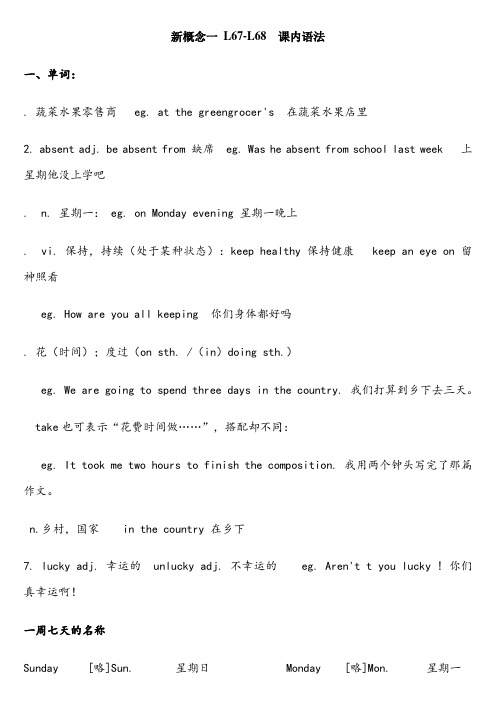
新概念一L67-L68 课内语法一、单词:. 蔬菜水果零售商 eg. at the greengrocer's 在蔬菜水果店里2. absent adj. be absent from 缺席 eg. Was he absent from school last week 上星期他没上学吧. n. 星期一: eg. on Monday evening 星期一晚上. vi. 保持,持续(处于某种状态):keep healthy 保持健康 keep an eye on 留神照看eg. How are you all keeping 你们身体都好吗. 花(时间);度过(on sth. /(in)doing sth.)eg. We are going to spend three days in the country. 我们打算到乡下去三天。
take也可表示“花费时间做……”,搭配却不同:eg. It took me two hours to finish the composition. 我用两个钟头写完了那篇作文。
n.乡村,国家 in the country 在乡下7. lucky adj. 幸运的 unlucky adj. 不幸运的 eg. Aren't t you lucky ! 你们真幸运啊!一周七天的名称Sunday [略]Sun. 星期日 Monday [略]Mon. 星期一Tuesday [略]Tues. 星期二 Wednesday [略]Wed. 星期三Thursday [略]Thur(s)星期四 Friday [略]Fri. 星期五Saturday [略]Sat. 星期六 Weekday周日,工作日(周一至周五)Weekend周末(星期六和星期日)二、课文详注:1、Were you at the butcher's刚才您在肉店里吗at the butcher 's=at the at the butcher 's shop。
新概念英语第一册Lesson61_65生词和短语
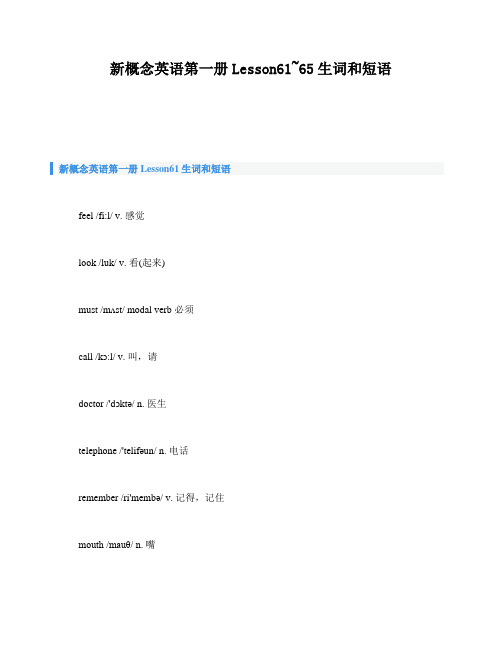
新概念英语第一册Lesson61~65生词和短语新概念英语第一册Lesson61生词和短语feel /fi:l/ v. 感觉look /luk/ v. 看(起来)must /mʌst/ modal verb 必须call /kɔ:l/ v. 叫,请doctor /'dɔktə/ n. 医生telephone /'telifəun/ n. 电话remember /ri'membə/ v. 记得,记住mouth /mauθ/ n. 嘴tongue /tʌŋ/ n. 舌头bad /bæd/ adj. 坏的,严重的cold /kəuld/ n. 感冒news /nju:z/ n. 消息新概念英语第一册Lesson62生词和短语headache /'hedeik/ n. 头痛aspirin /'æsprin/ n. 阿斯匹林earache /'Iəreik/ n. 耳痛toothache /'tu:θeik/ n. 牙痛dentist /'dentist/ n. 牙医stomach ache /'stʌmək-eik/ 胃痛medicine /'medisin/ n. 药temperature /'tempərətʃə/ n. 温度flu /flu:/ n. 流行性感冒measles /'mi:zəlz/ n. 麻疹mumps /mʌmps/ n. 腮腺炎新概念英语第一册Lesson63生词和短语better /'betə/ adj. 形容词well的比较级certainly /sə:tnli/ adv. 当然get up 起床yet /jet/ adv. 还,仍rich /ritʃ/ adj. 油腻的food /fu:d/ n. 食物remain /ri'mein/ v. 保持,继续新概念英语第一册Lesson64生词和短语play /plei/ v. 玩match /mætʃ/ n. 火柴talk /tɔ:k/ v. 谈话library /'laibrəri/ n. 图书馆drive /draiv/ v. 开车so /səu/ adv. 如此地quickly /'kwikli/ adv. 快地lean out of 身体探出break /breik/ v. 打破noise /nɔiz/ n. 喧闹声新概念英语第一册Lesson65生词和短语Dad /dæd/ n. 爸(儿语)key /ki:/ n. 钥匙baby /'beibi/ n. 婴儿hear /hiə/ v.听见enjoy /in'dʒɔi/ v. 玩得快活yourself /jɔ:self/ pron. 你自己ourselves /'auɔ'selvz/ pron. 我们自已mum /mʌm/ n. 妈妈。
新概念一Lesson61-62

8.mouth 9.tongue 11.cold
adj.坏的,严重的 10.bad
[kəuld]
[njuːz]
n.感冒
n.消息
12.news
Lesson 61
• • • • • • • • [fi:l] v.感觉 [luk] v.看(起来) [mʌst] 必须 [kɔ:l] v.叫,请 ['dɔktə] n.医生 ['telifəun] n.电话 [ri'membə] v.记得,记住 [mauθ] n.嘴
• • • • • • • •
1 feel 2 look 3 must 4 call 5 doctor 6 telephone 7 remember 8 mouth
• • • • • • • •
9 [tʌŋ] n.舌头 10 [bæd] a.坏的,严重的 11 [kəuld] n.感冒 12 [nju:z] n.消息 13 ['hedeik] n.头痛 14 ['æspərin] n.阿斯匹林 15 ['iəreik] n.耳痛 16 ['tu:θeik] n.牙痛
★
must
(动词)必须
1.表示义务、命令或必要 2. 表示推断
It's time to go to school, you must go now. She must be tired.
Jimmy, you must stay in bed for three months. We must study hard for our country.
look
(动词)看起来
多指表象,用在主语后,后面跟形容词
She looks sad.
He looks happy. Oh, it looks different.
新概念1 61-72课 单词 重点词组 重要句型
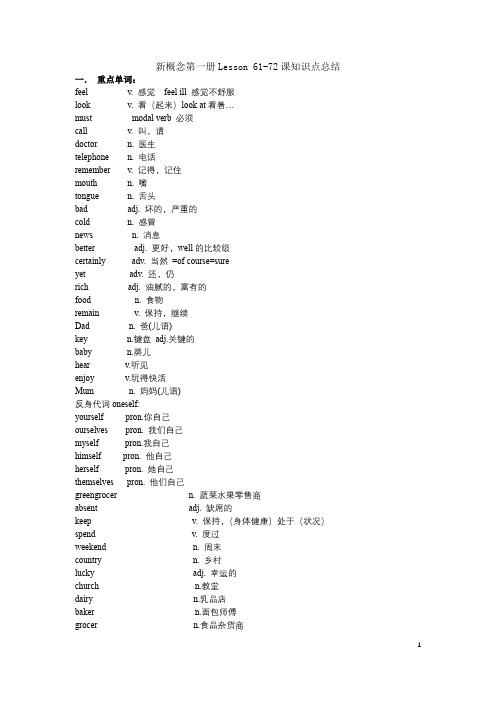
新概念第一册Lesson 61-72课知识点总结一.重点单词:feel v. 感觉feel ill 感觉不舒服look v. 看(起来)look at看着…must modal verb 必须call v. 叫,请doctor n. 医生telephone n. 电话remember v. 记得,记住mouth n. 嘴tongue n. 舌头bad adj. 坏的,严重的cold n. 感冒news n. 消息better adj. 更好,well的比较级certainly adv. 当然=of course=sureyet adv. 还,仍rich adj. 油腻的,富有的food n. 食物remain v. 保持,继续Dad n. 爸(儿语)key n.键盘adj.关键的baby n.婴儿hear v.听见enjoy v.玩得快活Mum n. 妈妈(儿语)反身代词oneself:yourself pron.你自己ourselves pron. 我们自己myself pron.我自己himself pron. 他自己herself pron. 她自己themselves pron. 他们自己greengrocer n. 蔬菜水果零售商absent adj. 缺席的keep v. 保持,(身体健康)处于(状况)spend v. 度过weekend n. 周末country n. 乡村lucky adj. 幸运的church n.教堂dairy n.乳品店baker n.面包师傅grocer n.食品杂货商星期几:Tuesday n. 星期二Wednesday n. 星期三Thursday n. 星期四Friday n. 星期五Saturday n. 星期六Sunday n. 星期日was v.是(am的一般过去时)were v.是(are的一般过去时)year n.年race n. 比赛town n. 城镇crowd n.人群stand v.站立,忍受exciting adj. 使人激动的(修饰物) excited adj.兴奋的,激动的(修饰人)just adv.正好,恰好finish n. 结尾,结束v.完成winner n.获胜者win v.获胜,赢得behind prep.在…之后stationer n.文具商awful adj. 让人讨厌的,坏的telephone v. & n. 打电话;电话time n. 次(数);时间answer v. 接(电话);回答last adj. 最后的,前一次的tonight 今晚phone n. 电话(=telephone)again adv. 又一次地say (said) /sed/ v. 说said(say的过去时)说二. 重点词组:call the doctor请医生call sb. up给某人打电话remember to do sth. 记得去做某事remember doing sth. 记得做过某事be bad for对…有坏处have a bad cold患重感冒good news好消息a piece of news 一则新闻stay in bed躺在床上feel ill 感觉不舒服take some medicine吃药see a doctor看医生have a temperature发烧take one’s temperature量某人的体温get up 起床rich food 油腻的食物play with… 玩…东西make a noise 制造噪音drive quickly 快速地开车lean out of…身体探出…the key to the door 门钥匙the key to the problem 问题的答案hear sb. do sth. 听见某人做过某事hear sb. doing sth. 听见某人正在做某事enjoy oneself 某人玩得开心enjoy sth./ doing sth. 喜欢某物/喜欢做某事by oneself 独自,独立at the greengrocer’s 在蔬菜水果店be absent from school 没去上学for the weekend 整个周末at the weekend 在周末at the baker’s 在面包店at the grocer’s 在杂货店at the stationer’s 在文具店win/lose a race 赢/输比赛in the crowd 在人群中crowd into… 涌入、挤进an exciting race 激动人心的比赛finish sth./doing sth. 完成做某事all the time 一直on time 按时,准时in time 及时answer the phone 接电话answer the door 应声开门answer a letter 回信on one’s way home 在某人回家的路上last night 昨夜again and again 屡次地,再三地三. 重点知识点:1.must do sth必须做某事,You mustn't do …你不准做某事,相当于祈使句D on’t do…对must引导的一般疑问句否定回答用you needn't2.感官动词➕形容词表示主观感受3.remember to do和remember doing的区别4.have ➕疾病的用法5.复习must的用法,强调must引导的一般疑问句的否定回答用:No,sb. needn't6.remain in bed=keep in bed=stay in bed7.keep ➕名词(代词)➕形容词,表示保持某种状态,例如keep quiet,keep the eggswarm8.do sth for ➕一段时间,表示做某事做了一段时间,如I sleep for 6 hours everyday9.复习can和must的用法,must的否定句是mustn’t,否定回答是needn’t.10.enjoy +oneself反身代词(好好玩吧),=have a good time. 反身代词的用法,详见PPT11.关于年龄的表达:基数词+years+old12.be动词的一般过去时,am改成was,are改成were13.when和where的用法14.日期和时间的表达,以及序数词15.一般过去时的there be句型,表示过去存在的状态。
新概念 第一册 短语73--110(汉英)
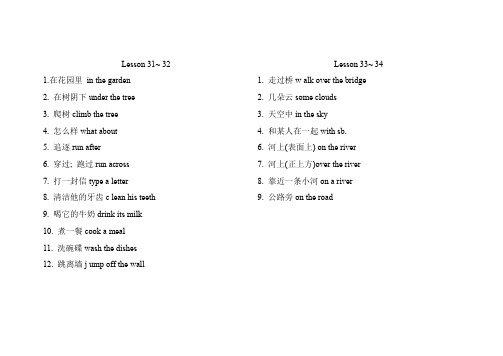
Lesson 31~ 321.在花园里in the garden2. 在树阴下under the tree3.爬树climb the tree4.怎么样what about5.追逐run after6. 穿过; 跑过run across7.打一封信type a letter8. 清洁他的牙齿c lean his teeth9. 喝它的牛奶drink its milk10.煮一餐cook a meal11.洗碗碟wash the dishes12.跳离墙j ump off the wallLesson 33~ 341.走过桥w alk over the bridge2.几朵云some clouds3. 天空中in the sky4. 和某人在一起with sb.6. 河上(表面上) on the river7. 河上(正上方)over the river8. 靠近一条小河on a river9. 公路旁on the roadLesson 35~ 361.我们村庄的照片a photograph of our village2.另一张照片another photograph3.两座小山之间between two hills4.沿着??走walk along5.河岸the banks of the river6. “从里向外”的动作out of7.走出??go out of ?8.公园的旁边beside a park= next to a park9.他们中的几个some of them10.走进??go into ?11.沿着??跑run along ?12.坐在??旁边sit beside ?13.穿过??走过walk across ?14. 跳离??jump off ?15.从某地飞过fly over**Lesson 37~ 381.努力工作work hard2.努力学习study hard3.拼命玩play hard4.做一个书架make a bookcase5.做蛋糕make cakes6.做一件衣服make a dress7.做作业do one’s homework8.等候??wait for ?9.听??listen to ?10. 洗碗wash the dishesLesson 39~ 401.对某件事物或人的处理do with2.在……之前in front of ……3.在……的前部in the front of……4.小心点!Be careful!5.拿着某物小心点be careful with sth.6.就放在那里There we are.7.给某人看某物show sb. sth. = show sth. to sb.8.送给某人某物send sb. sth. = send sth. to sb.9.带给某人某物take sb. sth. takesth. to sb.10.扔给某人某物throw sb. sth. = throw sth. to sb.11.留给某人某物leave sb. sth. = leave sth. for sb.12.买给某人某物buy sb. sth. = buy sth. for sb.Lesson 41~ 421.不是很*?Not very* .2.一块乳酪a piece of cheese3.两块乳酪two pieces of cheese4.一张纸a piece / slice of paper5.一个面包a loaf of bread6.三个面包three loaves of bread7.一片面包a piece / slice of bread8.一块肥皂a bar of soap9.两块巧克力two bars of chocolate10.一瓶牛奶a bottle of milk11.一磅糖a pound of sugar12.一包糖a bag of sugar13.h半磅咖啡alf a pound of coffee14.四分之一磅茶叶a quarter of a pound of tea15.一听烟丝a tin of tobacco16.一条裤子/袜子/鞋a pair of trousers/ soaks/ shoes17.一盒牛奶a box of milkLesson 43~ 441.沏茶make the tea2.当然of course3.一壶水a kettle of water4.茶壶后面behind the teapot5.找到某物findsth.6.在那边over there7. 赶快hurry upLesson 45~ 461.来这come here2.来某个地方come to (a place)3.去某个地方go to (a place)4.一会儿a minute = a moment = half a minute5.稍等一会儿wait a minute6.隔壁next door = in the next room7.红茶black tea8.老板的书写boss’s handwritingLesson 47~ 481.不加牛奶的咖啡(清咖啡)black coffee2.加牛奶的咖啡white coffee3.新鲜的鸡蛋fresh eggs4.一盒黄油a box of butter5.一瓶纯净的蜂蜜a bottle of pure honey6. 一串成熟的香蕉a cluster of ripe bananas7.一瓶果酱abottle of jam8.甜橙sweet orange9.一大瓶苏格兰威士忌a big bottle of Scotch whisky10.精选的苹果choice applesLesson 49~ 501. 老实说; 说实话To tell you the truth.2. 坦率地说to be honestLesson 51~ 52 come from 来自be like 怎么样every day 每天in your country 在你们国家in spring 在春天in March 在三月Lesson 53~ 54 in the north of England 在英国的北部in the east of China 在中国的东部in the South/ West在南方/西方which seasons 哪些季节like best 最喜欢的subject of conversation 谈论的话题Lesson 55~ 56the Sawyers 索耶一家at 87 King Street 在国王街87号in King Street 在国王街go to work/ bed/school去上班/睡觉/上学take sb to (a place) 带某人去某个地方stay at home 呆在家里eat one’s lunch 吃午饭dosth. together 一起做某事in the morning/afternoon/ evening在上午/下午/晚上at noon/night在正午/夜里this morning/ afternoon/ evening今天上午/下午/晚上tonight 今晚come home 回家arrive home 到家come home from school/work放学/下班回家read one’s newspaper 看报纸watch TV 看电视Lesson 57~ 58 by car/ plane/ bike乘汽车/飞机/单车by boat 乘船= by seaon foot 步行at the moment 此刻Lesson 59~ 60 large (small) size 大(小) 码a piece / sheet of paper 一张纸a piece / sheet of writing paper 一张信纸a piece (box) of chalk 一枝(盒) 粉笔a bottle of glue 一瓶胶水a pair of glasses 一副眼镜a cluster of grapes 一串葡萄Is that all ?就这些吗?That’s all. 就这些。
新概念英语第一册 学习笔记

新概念英语第一册学习笔记第61至72课61至72课涉及到的语法有:完全动词 have(2)(lesson 61)、情态动词must (lesson 61)、形容词比较级(lesson 63)、反身代词(lesson65)、时间与日期(lesson 66)、用介词at, on和in的时间短语(lesson 67)、一般过去时(2)(lesson 67、69、71)Lesson 61 A bad coldtongue n. 舌头remember v. 记得,记住。
含义较广,多指无意识地回忆起往事,也可指通过主观努力去记忆。
retell vt. 再讲,重复,重说recite v.背诵,朗读,叙述recall 记忆,记住,回忆,比remember文雅,指想方设法回忆已经遗忘之事。
recollect v.(不用于进行时)记起;回忆起;记得。
指在记忆中搜索,设法想起一时想不起的事情或人,强调过程。
remind 使想起,指经某人或某事的提醒而回忆起某件已遗忘之事。
memorize指有意识的下功夫把某事的整个细节都记在脑子里。
review v.复习,复查或重新考虑(某事物);思考(尤指往事),回顾repeat 引用,复述,仅强调口头或笔头重复别人的话或字句,并不必指明出处。
cite 指引经据典以示证明或凭据。
quote指不加剪裁的直接引用原文或原话。
[kwəut]fell ill, 感觉病了;look ill, 看起来有病。
前者指自我感觉,后者指外表形象。
ill是表语,look和feel都是系动词,可像am/is/are那样,后面跟形容词。
…so he must stay in bed for a week…因此他必须卧床休息一周。
so表示"因此"、"所以"。
for可以引出一段时间,表示某个动作持续多少时间。
又如:for two hours each day 每天两小时That's good news for Jimmy. 对吉米来说,这可是个好消息。
新概念英语第一册61-80课后短语总结
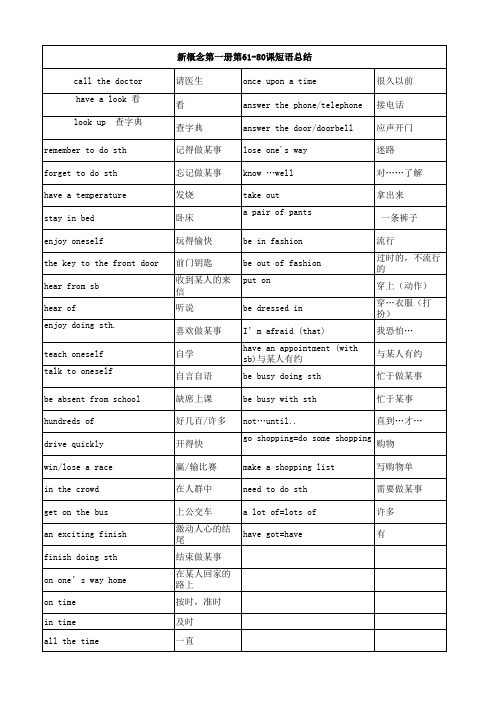
激动人心的结尾 have got=have 结束做某事 在某人回家的路上 按时,准时 th forget to do sth have a temperature stay in bed enjoy oneself the key to the front door hear from sb hear of enjoy doing sth. teach oneself talk to oneself be absent from school hundreds of drive quickly win/lose a race in the crowd get on the bus an exciting finish finish doing sth on one’s way home on time in time all the time
新概念英语第一册lesson67-68
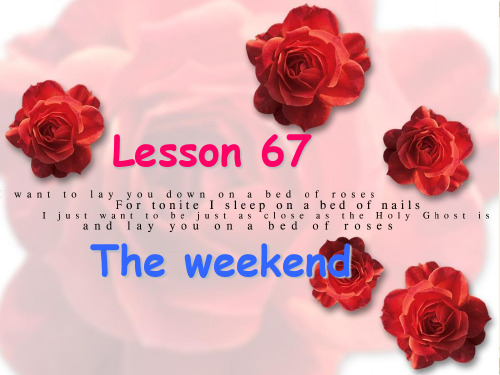
2、以不发音的字母e结尾的动词,直接加d。 hoped,lived, believed 3、辅音字母加y结尾的单词,要把y变i加ed
studied,worried,
4、重读闭音节单词需双写最后一个辅音字 母,再加ed。 fitted ,stopped, shipped
5、有些动词不符合上面的规则,需
just now 刚才 in the old days 在过去 in those days 在那些日子里 in 1980 the other day 过去的某一天 at that time 在那时 once upon a time 从前
一般过去时的构成
所有时态都是通过动词变化来表现的
E.g. You are right.
一般现在时
I want to go to school.
We are doing our housework now. 正在 The bus is leaving at 8:00.
进行 时
一般过去时的谓语构成: be动词(was,were) 助动词(did) 主语+谓语 情态动词(could, might) 实义动词(有确切含义的动词,可
n. 蔬菜水果零售商 adj. 缺席的 n. 星期一 n. 星期二 n. 星期三
Wednesday [ˈwenzdi]
Thursday [ˈθ ə:zdi] keep [ki:p] spend [spend] weekend [ˈwi:kˈend] Friday [ˈfraidi]
n. 星期四 v. (身体健康)处于(状况) v. 度过 n. 周末 n. 星期五
要特殊记忆。
am-was,
新概念英语第一册Lesson61-62笔记(语法点+配套练习+答案)

请医生
have a temperature
发烧
show sb. sth.
给某人看某物
have flu
患流感
have a bad cold
得了重感冒
have measles
患麻疹
stay in bed
呆在床上
have mumps
患腮腺炎
good news
好消息
see a doctor
look +形容词
look like+n.看起来像...
Look! Some boysare playingbaseball.
快看!一些男孩在打棒球。
look at看
Look atthem(they). They look very happy.
look out of the window向窗外看
You lookunhappy.你看起来不开心。
看医生
take an aspirin
吃阿ቤተ መጻሕፍቲ ባይዱ匹林
see a dentist
看牙医
take some medicine
吃药
5、语法解析
1.have(have got)
单三形式has / has got
1有,后跟名词
2患有,后跟疾病
have a/an +单数(疾病)
have acold感冒have atemperature发烧have aheadache头疼
我一定要在半小时内完成作业吗?
No, youneedn’t.不,不需要。
call v.请,叫,打电话
call the doctor请医生
call on sb.拜访某人
全]新概念英语第一册全册短语归纳大全
![全]新概念英语第一册全册短语归纳大全](https://img.taocdn.com/s3/m/28806c1a0166f5335a8102d276a20029bd6463dc.png)
全]新概念英语第一册全册短语归纳大全New Concept English Unit 1-2: Common Phrases1.Excuse me - Sorry。
can I interrupt?2.I beg your pardon - Could you please repeat that?3.Thank you - Thanks.4.Thank you very much - Many thanks。
thanks a lot。
thanks very much.5.You're e - No need to thank me。
it's okay。
not at all。
it was nothing.6.It's a pleasure - I'm happy to help。
my pleasure.7.I'm sorry - Apologies.8.Good morning - Hello in the morning.9.This is + name - Let me XXX.10.Nice to meet you - Pleased to meet you。
glad to meet you.11.How do you do。
- Hello。
how are you?12.What make。
- What brand?13.A new student - A new student.14.XXX。
- What is your nality?15.What's your job。
- What do you do for a living?16.A keyboard operator - A computer operator.17.An engineer - XXX.18.How are you。
- How are you doing?19.I'm fine - I'm good。
新概念英语第一册单词lesson61-80
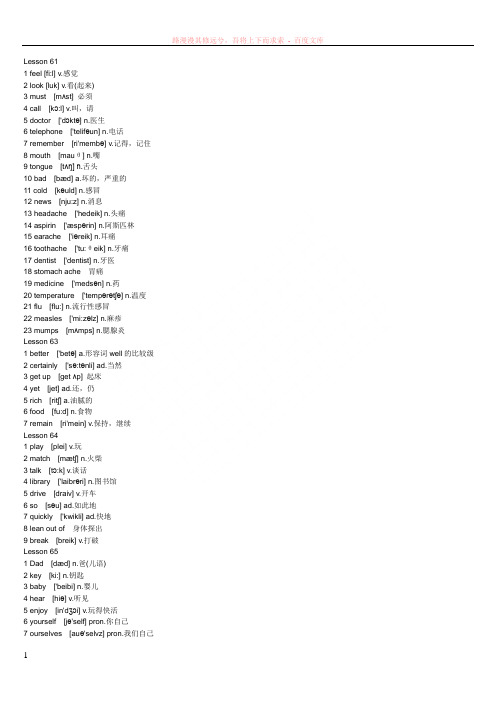
1 feel [fi:l] v.感觉2 look [luk] v.看(起来)3 must [mʌst] 必须4 call [kɔ:l] v.叫,请5 doctor ['dɔktə] n.医生6 telephone ['telifəun] n.电话7 remember [ri'membə] v.记得,记住8 mouth [mauθ] n.嘴9 tongue [tʌŋ] n.舌头10 bad [bæd] a.坏的,严重的11 cold [kəuld] n.感冒12 news [nju:z] n.消息13 headache ['hedeik] n.头痛14 aspirin ['æspərin] n.阿斯匹林15 earache ['iəreik] n.耳痛16 toothache ['tu:θeik] n.牙痛17 dentist ['dentist] n.牙医18 stomach ache 胃痛19 medicine ['medsən] n.药20 temperature ['tempərətʃə] n.温度21 flu [flu:] n.流行性感冒22 measles ['mi:zəlz] n.麻疹23 mumps [mʌmps] n.腮腺炎Lesson 631 better ['betə] a.形容词well的比较级2 certainly ['sə:tənli] ad.当然3 get up [get ʌp] 起床4 yet [jet] ad.还,仍5 rich [ritʃ] a.油腻的6 food [fu:d] n.食物7 remain [ri'mein] v.保持,继续Lesson 641 play [plei] v.玩2 match [mætʃ] n.火柴3 talk [tɔ:k] v.谈话4 library ['laibrəri] n.图书馆5 drive [draiv] v.开车6 so [səu] ad.如此地7 quickly ['kwikli] ad.快地8 lean out of 身体探出9 break [breik] v.打破Lesson 651 Dad [dæd] n.爸(儿语)2 key [ki:] n.钥匙3 baby ['beibi] n.婴儿4 hear [hiə] v.听见5 enjoy [in'dʒɔi] v.玩得快活6 yourself [jə'self] pron.你自己7 ourselves [auə'selvz] pron.我们自己1 myself [mai'self] pron.我自己2 themselves [ðəm'selvz] pron.他们自己3 himself [him'self] pron.他自己4 herself [hə:'self] pron.她自己Lesson 67greengrocer['gri:nˌgrəusə] n.蔬菜水果零售商2 absent ['æbsənt, əb'sent] a.缺席的3 Monday ['mʌndi] n.星期一4 Tuesday ['tju:zdi:, 'tu:z-] n.星期二5 Wednesday ['wenzdi] n.星期三6 Thursday ['θə:zdi] 星期四7 keep [ki:p] v.(身体健康)处于(状况)8 spend [spend] v.度过9 weekend ['wi:kend, ˌwi:k'end] n.周末10 Friday ['fraidi] n.星期五11 Saturday ['sætədi] n.星期六12 Sunday ['sʌndi] n.星期日13 country ['kʌntri] n.乡村14 lucky ['lʌki] a.幸运的Lesson 681 church [tʃə:tʃ] n.教堂2 dairy ['deəri] n.乳品店3 baker ['beikə] n.面包师傅4 grocer ['grəusə] n.食品杂货商Lesson 691 year [jiə, jə:] n.年2 race [reis] n.比赛3 town [taun] n.城镇4 crowd [kraud] n.人群5 stand [stænd] v.站立6 exciting [ik'saitiŋ] a.使人激动的7 just [dʒʌst] ad.正好,恰好8 finish ['finiʃ] n.结尾,结束9 winner ['winə] n.获胜者10 behind [bi'haind] prop.在…之后11 way [wei] n.路途Lesson 711 awful ['ɔ:ful] ad.让人讨厌的,坏的2 telephone ['telifəun] v.& n.打电话3 time [taim] n.次(数)4 answer ['ɑ:nsə] v.接(电话)5 last [lɑ:st] a.最后的,前一次的6 phone [fəun] n.电话(=telephone)7 again [ə'gein] ad.又一次地8 say [sei] v.说Lesson 731 week [wi:k] n.周2 London ['lʌndən] n.伦敦3 suddenly ['sʌdnli] ad.突然地4 bus stop ['bʌstɔp] 公共汽车车站5 smile [smail] v.微笑6 pleasantly ['plezntli] ad.愉快地7 understand [ˌʌndə'stænd] v.懂,明白8 speak [spi:k] v.讲,说9 hand [hænd] n.手10 pocket ['pɔkit] n.衣袋11 phrasebook n.短语手册,常用语手册12 phrase [freiz] n.短语13 slowly ['sləuli] ad.缓慢地Lesson 741 hurriedly ['hʌridli] ad.匆忙地2 cut [kʌt] v.割,切3 thirstily ['θə:stili] ad.口渴地4 go [gəu] v.走5 greet [gri:t] v.问候,找招呼Lesson 751 ago [ə'gəu] ad.以前2 buy [bai] v.买3 pair [peə] n.双,对4 fashion ['fæʃən] n.(服装的)流行式样5 uncomfortable [ʌn'kʌmftəbəl] a.不舒服的6 wear [weə] v.穿着Lesson 771 appointment [ə'pɔintmənt] n.约会,预约2 urgent ['ə:dʒənt] a.紧急的,急迫的3 till [til] prep.直到…为止Lesson 791 shopping ['ʃɔpiŋ] n.购物2 list [list] n.单子3 vegetable ['vedʒtəbəl] n.蔬菜4 need [ni:d] v.需要5 hope [həup] v.希望6 thing [θiŋ] n.事情7 money ['mʌni] n.钱Lesson 801 groceries ['grəusəriz] n.食品杂货2 fruit [fru:t] n.水果3 stationery ['steiʃənəri, -neri] n.文具4 newsagent ['nju:zˌeidʒənt] n.报刊零售人5 chemist ['kemist] n.化剂师,化学家。
新概念第一册重点及重要句型61-72
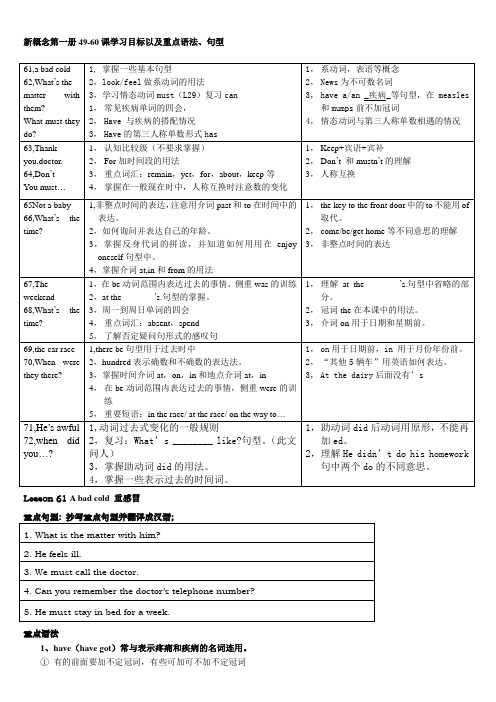
新概念第一册49-60课学习目标以及重点语法、句型Lesson 61 A bad cold 重感冒重点语法1、have(have got)常与表示疼痛和疾病的名词连用。
①有的前面要加不定冠词,有些可加可不加不定冠词have a cold;have (a) backache/tomach ache/toothache②复数形式的疾病名称前面不用冠,如measles(麻疹),mumps(流行性腮腺炎),shingles(带子状疱疹)Most children are in bed with mumps.③被认为不可数的疾病名称前面不用冠词,如flu(流行性感冒),gout(痛风),hepatitis(肝炎)I was in bed with flu for ten days.the也可以与flu,measles和mumps等词连用He’s got the flu/the measles/the mumps.2.主语+系动词+表语系动词:be动词,感官动词主系表结构,其中系动词(link-verb)包括be动词和感官动词。
be动词后可跟形容词和名词;感官动词后多加形容词做表语。
主系表结构的句子中,表语一般是形容词、代词和名词充当。
感官动词:feel/smell/look/tasteI feel happy. The food smells terrible. She looks sad. This tastes good.Lesson 63 Thank you, doctor 谢谢你,医生重点语法1.情态动词must的用法:must是情态动词,表示“必须”、“应当”,与have to相似,表示不可逃避的义务。
在说话人看来,没有选择的余地。
但must带有个人色彩,表示说话人的主观意图。
表示个人感情时通常用must。
You must…(你必须……)表示说话人说/认为……是必要的。
You must open the window.Must I open the window?2.each和every的区别:each强调个体;它是adj.&pron.,形容词起修饰限定作用,代词可单独使用;each指两个或两个以上中的每一个。
新概念一 61-70短语总结

NCE I Lesson 61----70 的总结重点单词1. feel 感觉2.look 看3.must 必须4.call 请5.doctor 医生6.telephone 电话7.remember记得8.mouth 嘴9.tongue 舌头10. bad 坏的严重的11.cold 感冒12.news 消息13.headache 头痛14.aspirin 阿斯匹林15.earache 耳痛16.toothache 牙痛17.dentist 牙医18.stomach ache 胃痛19.medicine 药20.temperature 温度21.flu 流行性感冒22.measles 麻疹23.mumps 腮腺炎24.better 形容词well的比较级25.certatily 当然26.get up 起27. yet 还,仍28.rich 油腻的29.food 食物30.remain 保持,继续31.play 玩32.match 火柴33.talk 谈话34.library 图书馆35.drive 开车36.so 如此地37.quickly 快地38.lean out of 身体探出39.break 打破40.noise 喧闹声41.Dad 爸(儿语) 42.key 钥匙43.baby 婴儿44.hear 听见45.enjoy 玩的快活46.yourself 你自己47.ourselves 我们自己48.mum 妈妈49.myself 我自己50.themselves 他们自己51.himself 他自己52.herself 她自己53. greengrocer 蔬菜水果零售商54.absent 缺席的55.Monday 星期一56.Tuesday 星期二57.Wednesday 星期三58.Thursday 星期四59. keep 处于60.spend 度过61.weekend 周末62.Friday 星期五63.Saturday 星期六64.Sunday 星期日65.country 乡村66.lucky 幸运的67.church 教堂68. dairy 乳品店69.baker 面包师傅70.grocer 食品杂货店71.year 年72.race 比赛73.town城镇74.crowd 人群75.stand 站立76. exciting 使人激动的77.just 正好,恰好78.finish 结尾,结束79.winner 获胜者80. behind 在...之后81.way 路途82.stationer 文具商83.Denmark 丹麦共83个重点短语1.in bed 卧床2.feel ill 感觉不舒服3.look ill看上去不舒服4.call a doctor 请医生5.see a doctor 看医生6.go to the doctor's 去诊所7.telephone number 电话号8.open your mouth 张开嘴9.show me your picture 给我看看你的画10.have a bad cold 重感冒 11.have a cold 感冒 12.be bad at... ...方面不擅长 13.stay in bed 呆在床上 14.good newws 好消息 15.take a temperature 量体温 16.have a temperature 发烧 17.have (take) some medicine 吃药 18.go to the dentist' 去牙医诊所 19.have a headache 头疼 20. have (take) an aspirin 吃一片阿司匹林 e upstairs 上楼来 22.look very well 看起来非常好 23.get up 起床24.another two days 另两天 25.rich food 油腻的食物26.fast food 快餐27.each (every) day 每天 28.keep the room warm 保持房间暖和 29.have a temperature 发烧 30.remain in bed 继续卧床 31.stay in bed 呆在床上 32.have a bad cold 患重感冒 33.be in bed 卧床 34.play with 摆弄玩弄 35.a football match 足球赛 36.talk to sb 同...讲话 37.talk about.... 谈论... 38.go to the library 去图书馆39.drive to the park 开车去公园 40. lean out of the window身体探出窗外 41.make a noise弄出声音 42.have a break 休息一会 43.so quickly 如此的迅速 44.this evening 今天晚上 45.see some friends看望几个朋友 e home回家晚46.at half past ten 在十点半 47.get home 到家 48.so early那么早 49.the key to the front door 前门钥匙 50.the backdoor 后门 51.the key to... ...的答案 52.give her thekey 给她钥匙 e home early 回家早 e homelate 回家晚 55.all right 好吧 56.listen to... 听...57. after a quarter past eleven 十一点十五后58.That's allright 不用谢 59. hear from sb 收到某人的来信 60.hearof... 听说... 61.at the butcher's 在肉店 62.at the greengrocer's 在蔬菜水果店 63.be absent from... ...缺席 st week 上周65. on Monday 在周一 66.in thecountry 在乡下67.spend...(钱/时间) on sth . 在...上花了...(钱/时间) 68.stay at my mother’s 呆在我妈妈家 69.alucky dog 幸运儿 70.Good luck 祝你好运 71.at church 在教堂72.at(in) the office 在办公室 73.at school 在学校74.at the baker's 在面包店 75. at the hairdresser's 在理发店 76.at the butcher's 在肉店 77.at the dairy在乳品店78.at home 在家 79.at the grocer's 在食杂店 80.in thecountry 在乡下 81.a car race 一次车赛 82. near our town 在我们城镇附近 83.every year 每年 84.in 1995 在 1995年 85. hundreds of... 数以百计的... 86. at the race 出席(观看)比赛 87.in the crowd 在人群里 88.on the left 在左边 89.on the right 在右边 90.in the race 在比赛当中91. an exciting finish 一个令人激动的结尾 92.finish doingsth 完成做某事 93.car number fifteen 十五号车94.behind him在他后面 95.five other cars 其他的五辆车96.on the way home 在回家的路上97.on the way to... 在去...的路上 98.say to sb . 对... 说 99.on Monday 在周一100. on January 21st 在一月二十一日 101.in July 在七月102.in 1985 在1985年共102个重点语法总结1.从属连词because引导的原因状语从句:起状语作用的从句叫作状语从句,状语从句由从属连词引导,根据从句与主句的关系,状语从句可分为条件.地点.时间.原因..目的.结果.方式.让步.以及比较等状语从句,状语从句的位置比较灵活,可以放在句首.此时状语后常用逗号;也可以放在句中,此时状语从句前一般不用逗号,原因:状语从句常由从属连词because, as since so that 等引导,其中because的语气最强,它引导的从句可以回答why(为什么)所提出的问题,它所引导的从句常放在主句之后,如:why is that good news for Jimny?为什么这对吉米来说是个好消息Because he doesn’t like school.因为他不喜欢学校He met with an accident because he was care less in driving 他出了事故,因为他开车不小心.2.反身代词反身代词的含义为“…….自己”,一般用于强调动词的宾语与主语为同一人或事物.反身代词各个人称的词形如下表:当宾语和主语是同一人时,需要用到反身代词,如:He cut himself when he was shaving this morning今天早上刮胡子时,他把脸刮破了.3.动词be 的一般过去时:动词的一般过去时表示的是过去一个特定时刻或者时期所发生的事情.英文中,动词be 的一般过去时属于不规划变化,第一,第三人称单数的一般过去时为was,其他情况用were如:I am very busy today,but I was free yesterday.我今天很忙,但是昨天我有空. We were at the butcher’s last Friday.动词be 的一般过去时在变为一般短问句以及否定句的时候,与其一般现在时的格式一样,只需要根据人称将be 动词改为was 或were 只需要根据人称将be改为was 或 were.如:was Mrs Johnson at the baker’s just now?No,she wasn’t.Were you at school on September 15th?I wasn’t at school on that dayI was out of town.Where were they on Saturday?They were in the supermarket.4.用所有格形式店铺等的方法英文中,表示店铺住宅或某人的家时,名词所有格后面通常不出现它所修辞的名词,如:the butcher’s(shop) 肉铺The grocer’s(shop)杂货铺The green grocer’s(shop)蔬菜水果店The stationer’s(shop) 文具店My brother’s (mouse) 我哥哥的家5.介词 on后接具体日期。
句型转换(61-68)
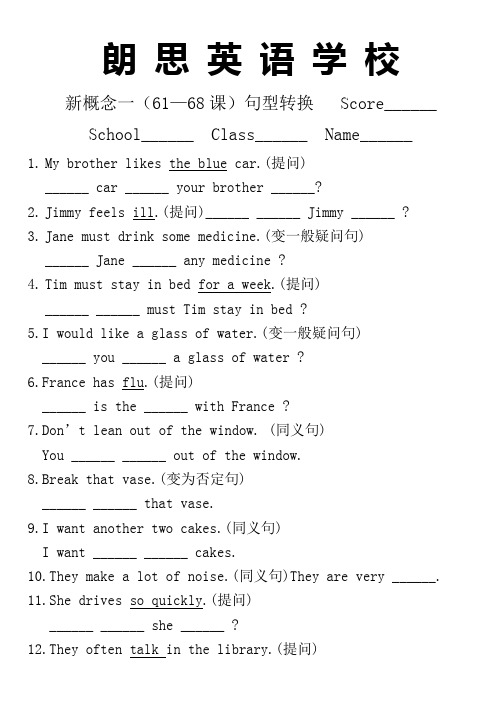
朗思英语学校新概念一(61—68课)句型转换 Score______ School______ Class______ Name______1.My brother likes the blue car.(提问)______ car ______ your brother ______?2.Jimmy feels ill.(提问)______ ______ Jimmy ______ ?3.Jane must drink some medicine.(变一般疑问句)______ Jane ______ any medicine ?4.Tim must stay in bed for a week.(提问)______ ______ must Tim stay in bed ?5.I would like a glass of water.(变一般疑问句)______ you ______ a glass of water ?6.France has flu.(提问)______ is the ______ with France ?7.Don’t lean out of the window. (同义句)You ______ ______ out of the window.8.Break that vase.(变为否定句)______ ______ that vase.9.I want another two cakes.(同义句)I want ______ ______ cakes.10.They make a lot of noise.(同义句)They are very ______.11.She drives so quickly.(提问)______ ______ she ______ ?12.They often talk in the library.(提问)______ ______ they often ______ in the library ?13.You must make a noise. (变为否定句)You ______ ______ a noise.14.Betty is eighteen years old. (提问)______ ______ is Betty ?15.She is enjoying herself at the party. (同义句)She is ______ ______ ______ time at the party.16.We always enjoy ourselves. (变一般疑问句)______ you always ______ ______ ?17.She must come home at a quarter past ten. (提问)______ must she ______ home ?18.Jimmy was absent from school last week. (同义句)Jimmy was ______ from school last week.19.We are going to stay at my mother’s for the weekend(同义句) We are going to stay at my mother’s _____ _____the weekend.20.She was at the baker’s on Friday,June 6th. (提问)______ ______ she at the baker’s ?21.You are not lucky.(同义句) You are ______ .22.You mustn’t come home after a quarter past eleven.(同义句) You ______ come home ______ a quarter past eleven.23.We always enjoy ourselves.(同义句)We always ______ a good ______ .24.How are you all keeping ? (同义句)How are ______ of ______ keeping ?25.They stay in the country on Saturday and Sunday. (同义句) They stay in the country at the ______ .。
新概念第一册 lesson 67-68 课堂及课后练习

新概念一L67-L68 课内语法一、单词:. 蔬菜水果零售商eg. at the greengrocer's 在蔬菜水果店里2. absent adj. be absent from 缺席eg. Was he absent from school last week 上星期他没上学吧. n. 星期一:eg. on Monday evening 星期一晚上. vi. 保持,持续(处于某种状态):keep healthy 保持健康keep an eye on 留神照看eg. How are you all keeping 你们身体都好吗. 花(时间);度过(on sth. /(in)doing sth.)eg. We are going to spend three days in the country. 我们打算到乡下去三天。
take也可表示“花费时间做……”,搭配却不同:%eg. It took me two hours to finish the composition. 我用两个钟头写完了那篇作文。
n.乡村,国家in the country 在乡下7. lucky adj. 幸运的unlucky adj. 不幸运的eg. Aren't t you lucky ! 你们真幸运啊!一周七天的名称Sunday [略]Sun. 星期日Monday [略]Mon. 星期一Tuesday [略]Tues. 星期二Wednesday [略]Wed. 星期三Thursday [略]Thur(s)星期四Friday [略]Fri. 星期五Saturday [略]Sat. 星期六Weekday周日,工作日(周一至周五)Weekend周末(星期六和星期日)二、课文详注:1、Were you at the butcher's刚才您在肉店里吗(at the butcher 's=at the at the butcher 's shop。
新概念英语第一册重点句型语法Lesson63~68

【导语】新概念英语⼀共144课。
整本书⽆论是语法还是词汇,题材还是语句,都有其出彩之处。
正是因为如此,新概念英语更是经久不衰,深受⼴⼤英语学习者的喜爱。
⽆忧考为您整理了“新概念英语第⼀册重点句型语法Lesson63~68”,希望可以帮助到您!新概念英语第⼀册重点句型语法Lesson63~64 ⼀、重要句型或语法 1、情态动词must与can的⽤法 1)must表必须,如:You must stay in bed. / Must he stay in bed? 2)can表许可,如:Can I see him please, Mrs. Williams? / He can get up for about two hours each day. 2、持续系动词 英语⾥持续系动词主要有:stay、remain、keep等,表⽰状态的持续,如:You must stay in bed for another two days. / He must remain in bed for another two days. / Please keep quiet. ⼆、课⽂主要语⾔点 How's Jimmy today? Better. Thank you, doctor. How's sb.?,⽤来询问某⼈的⾝体状况。
better为good/well的⽐较级,但因为本课尚未开始学习⽐较关系,所以只要告诉学⽣better表⽰更好的意思即可。
Can I see him please, Mrs. Williams? can作为情态动词,主要有三种意思:1)能够,表能⼒;2)可以,表许可;3)可能,表猜测。
本课主要⽤来表许可。
Certainly, doctor. certainly⽤来表⽰肯定或同意,相当于of course。
Come upstairs. upstairs由up和stairs组成,表⽰楼上。
(完整)新概念(一)61-68课词组
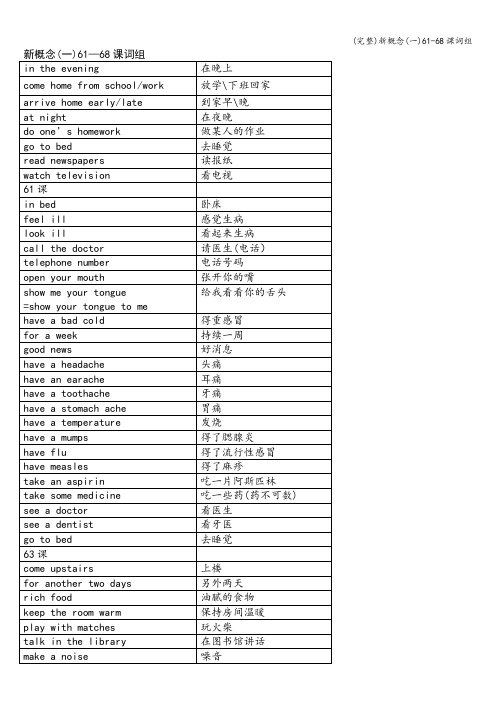
打破那个花瓶
65课
meet some friends
见几个朋友
come home late
到家晚
at half past ten
在10点钟
get home so early
到家如此的早
the key to the front door
带前门的钥匙
eighteen years old
十八岁
give her the hey
给她钥匙
all right
好的
after a quarter past eleven
过了十一点一刻
enjoy yourself
玩得高兴
67课
at the butcher’s
在肉店
at the greengrocer’s
在蔬菜水果店
be absent from
……缺席
得了腮腺炎
have flu得了流行性感冒来自have measles
得了麻疹
take an aspirin
吃一片阿斯匹林
take some medicine
吃一些药(药不可数)
see a doctor
看医生
see a dentist
看牙医
go to bed
去睡觉
63课
come upstairs
上楼
for another two days
给我看看你的舌头
have a bad cold
得重感冒
for a week
持续一周
good news
好消息
have a headache
头痛
have an earache
- 1、下载文档前请自行甄别文档内容的完整性,平台不提供额外的编辑、内容补充、找答案等附加服务。
- 2、"仅部分预览"的文档,不可在线预览部分如存在完整性等问题,可反馈申请退款(可完整预览的文档不适用该条件!)。
- 3、如文档侵犯您的权益,请联系客服反馈,我们会尽快为您处理(人工客服工作时间:9:00-18:30)。
新概念一61-68单词短语句型总结
Lesson 67-68
一.单词短语
1.蔬菜水果零售商_______
2. 周日_________
3. 周一_________
4. 周二_______
5. 周三________
6. 周四________
7. 周五________
8. 周六_______ 9. 周末_______ 10. 乡村_______ 11. 乳品店_______
12. 在肉店____ ____ _____ 13. 在做礼拜_____ _____ 14. 度过______ 15. am/is(过去式)______ 16. are(过去式)_____ 17. 缺席____ ____ ____ 18. 在周一_____ _____ 19. 在我妈妈家__________ 20. 都(两者)_____
21.都(三者或三者以上) ______
二. 句型翻译
1.刚才你在蔬菜水果店吗?是的,我在。
(过去式)
___________________ ____________
2. 我们打算在我妈妈家度周末。
________________________________
3. 你们身体都好吗?
_________________________?
4. 你们真幸运!
________________________.
Lesson 65-66
一.单词,短语
1.钥匙_____ ______ (复数)
2. 我自己_______
3. 我们自己_______
4. 你你们自己________/__________
5. 他自己______
2.6. 她自己______ 7. 它自己______ 8. 他们自己___________
9. 见几个朋友_____ _____ _____ 10. 在十点半____ _____ _____ _____
11. 听见某人做了/经常做某事_____ sb _____ sth
12. 听见某人正在做某事_____ sb ______ sth
二. 句型翻译
1.你今晚打算做什么,吉儿?
_____________________________________
2. 我能带上前门的钥匙吗?
_____________________________________
3. 我们总是玩得很开心。
______________________________________
4. 你不可以超过十一点一刻回家。
(after)
______________________________________
5. 她总是回家很早。
______________________________________。
